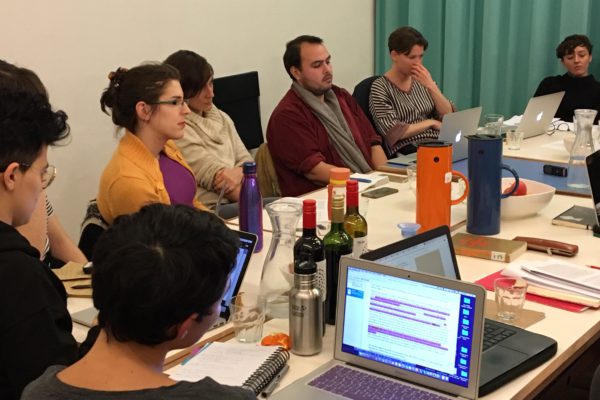The eighth series of ReadingRoom started in April 2023. We pick up the concerns of earlier series with CPC, the capitalist-patriarchal-colonial formation and its ecological devastation.In its first sessions, the series concentrates on the recent publication by the Earth4All initiative, entitled Earth for All: A Survival Guide for Humanity (September 2022). Sandrine Dixson-Declève, Owen Gaffney, Jayati Ghosh, Jorgen Randers, Johan Rockström and Per Espen Stoknes put together this most recent report to the Club of Rome, fifty years after The Limits of Growth (1972). As development economist Jayati Ghosh said at the recent World Economic Forum in Davos in January 2023, “skyrocketing wealth and income inequality” are still at the root of today’s global polycrisis. And, as the open letter of the Earth4All initiative’s Transformational Economics Commission to “world leaders” holds: “Despite the fact the world is in a climate emergency, the richest 1%— over 80 million people — are the fastest-growing source of emissions by far” – which means that “every single month the world burns through 1% of the remaining carbon budget for any hope of stabilising climate at 1.5°C” and that most people are “kept in a state of economic insecurity”, despite the world being wealthier than ever before (see https://www.earth4all.life/open-letter-davos-tax). We’d like to find out what we can learn from Earth for All. What insights the analyses might offer, but also which questions or hesitations might their suggestions generate?
The seventh series of ReadingRoom was running from November 2021 to March 2022, entitled Going Viral; or what just happenend? ReadingRoom had been interrupted by Covid-19 in March 2020 and given the unprecedented circumstances of the global pandemic, this series wanted to resist the urge to move forward and ‘past’ things all too quickly and rather offer a space to reflect together on what happened or, more precisely, on what was (and is) still happening. Can we think-read-feel together about the experiences of loss and change during the pandemic? About our diverging efforts of digesting those experiences? Can we find ways of collective grieving and working through? The series ran for only two sessions, again complicated by Covid-19. Session One (23 November 2021) was based on Laurent Berlant’s Cruel Optimism (2011) from which we read the “Introduction. Affect in the Present”. Berlant’s text helped us think about affect, public space, optimism and situations of crisis. By engaging with Berlant’s work, we also commemorated the loss of this wonderful thinker. Session Two (9 March 2022) engaged with Douglas Crimp’s piece “Mourning and Militancy” (October, vol 51, 1989).
The sixth series of ReadingRoom was running from October 2019 to January 2020, entitled It is Time… It continued to study CPC (fifth series) and considered how we can thread a critique of the on-going environmental destruction into our critical understanding of CPC. It is Time… to re-imagine futurity (or temporality itself), to invent new languages to speak different ecologies of living.
The fifth series of ReadingRoom was running from October 2018 to June 2019, entitled Reading Rosa, pink & other colors. It studied the interlocking systems of capitalism – patriarchy – colonialism, which we dubbed CPC. As this series coincided with the centennial of Rosa Luxemburg’s violent death in 1919, we started with her analysis of how a capitalist economy cannot sustain itself without simultaneous colonial expansion as well as a patriarchal societal foundation. Moving forward and backward in time, the series then looked into Black feminist critiques of CPC as well as “the family” as one of its incubators. Our fifth series resonated with Casco’s exhibition Terre Thaemlitz: Two Rubatos (8 March – 12 May 2019).
The fourth series of ReadingRoom was running from February to June 2018, discussing un/learning: the p/re/distribution of knowledge. This series asked how we host, organize and maintain knowledge and, more broadly, took up questions concerning access to, institutionalization of and the distribution of knowledge in its many forms. This series was in part inspired by the exhibition project The Library of Unread Books by Heman Chong and Renée Staal at Casco Art Institute (26 November 2017 – 25 February 2018).
The third series of ReadingRoom was running from September 2016 until May 2017, discussing WHO CARES? Politics and Poetics in the Affirmative. We studied feminist, decolonial and aesthetic interventions ‘in the affirmative’ into our contemporary planetary situation – especially looking at alternative spaces of education, activism and art and pursuing affirmation as a promising poetico-political tool to pass from mere opposition and negation to space-opening refusal.
The second series of ReadingRoom was running from September 2015 to February 2016, discussing relationality – envisioning new wor(l)dings. Relationality is one of the fundamental conditions of critical assessments and interventions today and has been very productively theorized in Caribbean thought and poetics. We engaged mainly with Fanon, Glissant and Wynter.
The first series of ReadingRoom was running from December 2014 to May 2015, discussing speculation & fabulation – critique in the SF mode. We looked at the theory and diverse forms of science fiction, reinvesting in imagination and speculation as crucial affective-critical tools for our present.
ReadingRoom participated in the exhibition @ Casco titled Casco Art Institute: Working for the Commons, which ran from Friday 26 May 2017 and through until 16 July 2017. To learn more about this project please click here.
ReadingRoom has received financial supported from the national research schools of Gender Studies (NOG) and Literary Studies (OSL) and by Aspasiagelden Diversiteitsbeleid.





